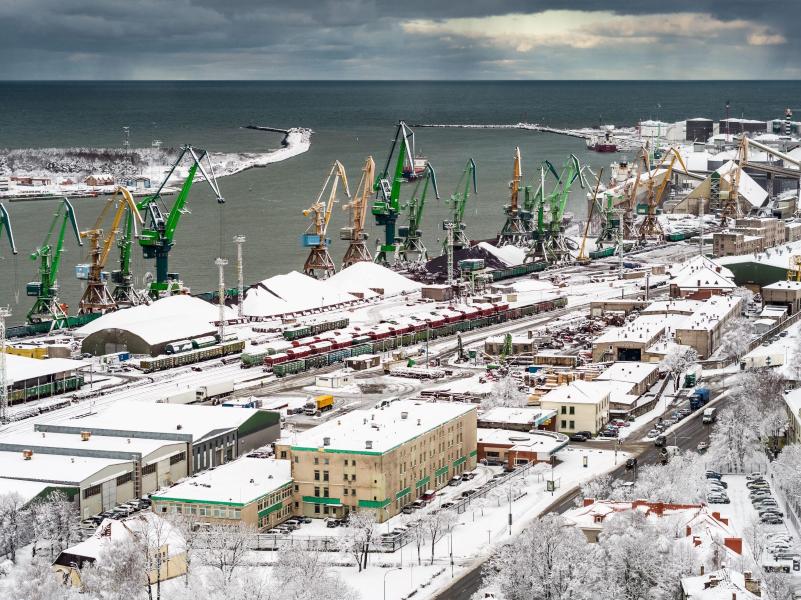
- The financing will be for the rehabilitation, extension and deepening of the port’s quay walls to facilitate access for larger vessels.
- The project supports an important European maritime transport hub and is of strategic importance for the Lithuanian economy.
- Greener shipping and climate action are at the centre of this project.
The European Investment Bank (EIB) and Klaipėda State Seaport Authority have signed a €65 million loan agreement for the development of Klaipėda seaport in Lithuania. Klaipėda is the main port connection in Lithuania, part of the TEN-T North Sea-Baltic corridor, and one of the largest port complexes in the Baltic Sea.
The key purpose of the project is for the seaport to be able to accommodate larger vessels and therefore lead to greater productivity. The transport hub will be for a variety of goods and cargo. As part of the EIB’s new transport lending policy, decarbonisation of ports as well as climate action and environmental sustainability are priorities for the EIB.
“The financing agreement that we signed today will enable us to continue implementing our ambitious vision of a modern and sustainable port, providing the highest quality services. We aim to welcome the biggest ships that can enter the Baltic Sea. Proper infrastructure — port depth, modern quay walls, a convenient port railway network — are a prerequisite for making this vision a reality. We are very happy that the Port Authority is capable of consistently borrowing on good terms, and that this contract with the EIB is no exception,” said Algis Latakas, Director General of Klaipėda State Seaport Authority.
“We at the EIB are pleased to support the development of Klaipėda seaport,” said EIB Vice-President Thomas Östros at the signing event in Vilnius today. “The project is of strategic importance for the Lithuanian economy and the development of maritime transport in Europe as it also offers a shift from road to sea transport. Accelerating the green transition is one of the EIB’s main priorities, and this will not happen without companies and financial institutions planning and implementing actual investment projects.”
Marius Skuodis, Minister of Transport and Communications of Lithuania, underlined the importance of the Port of Klaipėda to Lithuanian economy. “Port of Klaipėda is one of the largest transport hubs in Lithuania, providing our businesses access to the worldwide markets as well as ensuring Lithuania’s energy independence. Over the years, we have been consistently investing in the port’s infrastructure and we are committed to continuing our investment projects to ensure the port‘s competitiveness in the region.”
The EIB loan will complement financing from EU grants (€77 million) and the Nordic Investment Bank (€68 million loan signed at the beginning of 2020, a portion of which will co-finance the EIB project).
Earlier this year, the EIB also announced that it was providing advisory support to the Lithuanian Inland Waterways Authority (LIWA) to promote green inland cargo shipping between the two major cities of Klaipėda and Kaunas. With no CO2 emissions, this project will play a crucial role in revitalising freight transportation on Lithuania’s biggest river.
Background information
The European Investment Bank (EIB) is the long-term lending institution of the European Union and is owned by the EU Member States. The EIB Group has adopted a Climate Bank Roadmap to deliver on its ambitious agenda to support €1 trillion of climate action and environmental sustainability investments in the decade to 2030 and to deliver more than 50% of EIB finance for climate action and environmental sustainability by 2025. As part of the roadmap, all new EIB Group operations have been aligned with the goals and principles of the Paris Agreement since the start of 2021.
EIB’s new Transport Lending Policy, approved in July 2022, sets out the EIB’s priorities for supporting the transport sector, in line with the EIB Group Climate Bank Roadmap. The policy outlines the EIB’s investment priorities in supporting the rollout of new innovative technologies, as well as mature Paris-aligned projects that matter most to enable the transition of the transport sector to decarbonisation and depollution, safety and security, accessibility, greenness and efficiency (SAGE). Regarding maritime transport, the Bank prioritises support for the development of strategic port infrastructure as well as the digitalisation and decarbonisation of ports.
Klaipėda State Seaport Authority is responsible for infrastructure development and safe navigation of the Port of Klaipėda — one of the largest transport hubs in the Baltic Sea. Port Authority is consistently investing in modernisation of the quays, dredging works, the port’s railway network and other projects to ensure the port’s competitiveness.
The biggest development projects for the future include a new 100 ha container terminal, offshore windfarm installation infrastructure, and a port depth of 17 metres — the maximum needed in the Baltic Sea. Over the last 12 years, the port of Klaipeda’s cargo load has increased by an impressive 63% — from 27.9 million tonnes in 2009 to 45.6 million tonnes in 2021.



